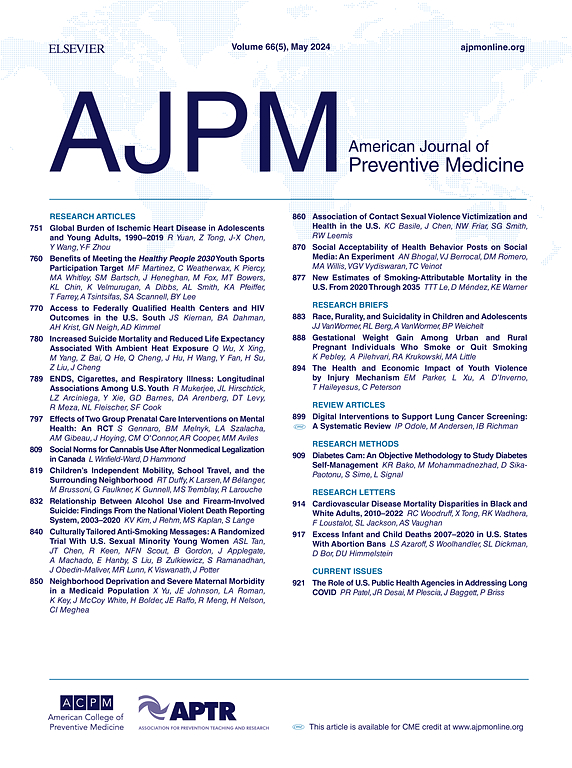人工智能驱动的青少年心理健康多模式预防系统:一项随机对照试验
IF 4.5
2区 医学
Q1 MEDICINE, GENERAL & INTERNAL
引用次数: 0
摘要
开发和验证一种多模式人工智能系统,用于早期发现和预防青少年心理健康障碍(如焦虑、抑郁),旨在通过个性化干预降低自杀风险和增强情绪弹性。方法一项为期12个月的随机对照试验(RCT)招募了1200名12-18岁的青少年,以评估集成神经成像、行为传感器和自然语言处理(NLP)的人工智能平台。该人工智能模型在10,000个多模态数据集上进行了训练,评估了声调、面部微表情和社交媒体文本,以预测自杀/抑郁风险(准确率=89%)。干预模块包括人工智能引导的认知行为疗法(CBT)、正念练习和同伴支持匹配。结果包括自杀意念率、情绪恢复得分和旷课率。结果与对照组相比,人工智能系统减少了34%的自杀意念(p<0.01),提高了27%的情绪恢复能力(p<0.001)。纵向数据显示在6个月的随访中持续获益,旷课率降低38% (OR=0.62, 95% CI: 0.51-0.75)。关键的风险预测因素包括声带震颤频率(AUC=0.85)和重复的负面社交媒体帖子(p=0.002)。联邦学习确保了干预期间的数据隐私遵从性。这一由人工智能驱动的预防系统显示出在青少年心理健康早期干预方面具有可扩展的潜力,可解决数字时代的社会心理风险。通过将实时风险检测与有针对性的行为支持相结合,它提供了一个公共卫生框架,以减轻自杀和情绪障碍,与全球青年精神健康优先事项保持一致。本文章由计算机程序翻译,如有差异,请以英文原文为准。
AI-Driven Multimodal Preventive System for Adolescent Mental Health: A Randomized Controlled Trial
Introduction
To develop and validate a multimodal AI system for early detection and prevention of adolescent mental health disorders (e.g., anxiety, depression), targeting suicide risk reduction and emotional resilience enhancement through personalized interventions.
Method
A 12-month randomized controlled trial (RCT) enrolled 1,200 adolescents (aged 12–18) to evaluate an AI platform integrating neuroimaging, behavioral sensors, and natural language processing (NLP). The AI model, trained on 10,000 multimodal datasets, assessed vocal tone, facial microexpressions, and social media text to predict suicide/depression risks (accuracy=89%). Intervention modules included AI-guided cognitive behavioral therapy (CBT), mindfulness exercises, and peer support matching. Outcomes included suicidal ideation rates, emotional resilience scores, and school absenteeism.
Results
The AI system reduced suicidal ideation by 34% (p<0.01) and improved emotional resilience by 27% (p<0.001) versus controls. Longitudinal data showed sustained benefits at 6-month follow-up, with 38% lower school absenteeism (OR=0.62, 95% CI: 0.51–0.75). Key predictors of risk included vocal tremor frequency (AUC=0.85) and repetitive negative social media posts (p=0.002). Federated learning ensured data privacy compliance during interventions.
Discussion
This AI-powered preventive system demonstrates scalable potential for early intervention in adolescent mental health, addressing digital-age psychosocial risks. By integrating real-time risk detection with targeted behavioral support, it offers a public health framework to mitigate suicide and emotional disorders, aligning with global priorities for youth mental well-being.
求助全文
通过发布文献求助,成功后即可免费获取论文全文。
去求助
来源期刊

American Journal of Preventive Medicine
医学-公共卫生、环境卫生与职业卫生
CiteScore
8.60
自引率
1.80%
发文量
395
审稿时长
32 days
期刊介绍:
The American Journal of Preventive Medicine is the official journal of the American College of Preventive Medicine and the Association for Prevention Teaching and Research. It publishes articles in the areas of prevention research, teaching, practice and policy. Original research is published on interventions aimed at the prevention of chronic and acute disease and the promotion of individual and community health.
Of particular emphasis are papers that address the primary and secondary prevention of important clinical, behavioral and public health issues such as injury and violence, infectious disease, women''s health, smoking, sedentary behaviors and physical activity, nutrition, diabetes, obesity, and substance use disorders. Papers also address educational initiatives aimed at improving the ability of health professionals to provide effective clinical prevention and public health services. Papers on health services research pertinent to prevention and public health are also published. The journal also publishes official policy statements from the two co-sponsoring organizations, review articles, media reviews, and editorials. Finally, the journal periodically publishes supplements and special theme issues devoted to areas of current interest to the prevention community.
 求助内容:
求助内容: 应助结果提醒方式:
应助结果提醒方式:


